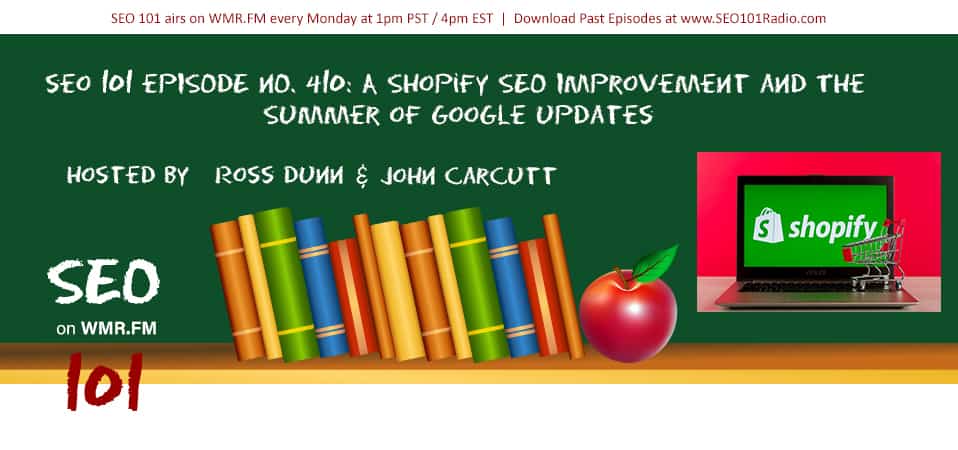The hosts discuss a much sought after SEO feature recently released by Shopify. They also tackle whether you should or you should not pause your SEO, and the significant Google Updates that have all commenced in relatively short order this Summer. To tie it all up, they shared some excellent Mueller Files.
Noteworthy links from this episode:
- Finally, Shopify site owners can edit their robots.txt files
- How Google Cuts & Ranks Result Sets With Magic Signals
- Google July 2021 Core Update Begins Rolling Out
- Google Offers 5 Content Creation Tips for Success
- (Global – Effects Web & Image Search):
- Google’s John Mueller: Sometimes There’s No SEO Solution
- Google’s John Mueller Doesn’t See SEO Becoming Obsolete
Transcription of Episode 410
Ross: Hello, and welcome to SEO 101 on WMR.fm episode number 410. This is Ross Dunn, CEO of StepForth Web Marketing, and my standing co-host is my company’s Senior SEO, Scott Van Achte.
Scott: Hello.
Ross: How is your day, my friend?
Scott: My day is always good when you’re a day away from a holiday. As you know, I’m off next week for some summer break that I’ve been waiting for since last summer. What it does is it makes a couple of days before that last one seven days, they feel like.
Ross: We do our best.
Scott: We do, but that’s the way it goes so it’s fine.
Ross: Yes, we always pay for our time off. It’s ridiculous how it works. I sometimes just simply don’t look forward to my two-week vacations whenever they do happen. It’s misery before that.
Scott: That’s why I rarely take two weeks off at a time. I think I’ve done it two or three times ever because you get so much more work you have to come back to. That’s the only thing I missed about the olden days of working in retail when I was in college is that you go away on a holiday and you come back somebody else has done all your work for you. It doesn’t happen in this industry, not for me anyway.
Ross: You do have some support now. You got people working for you so you can always get them to do a bunch of it.
Scott: That’s true, that does make a difference. Back in the day, it was impossible, but it’s good now.
Ross: I guess we should jump into this. This sounds like some pretty darn good news about Shopify. Why don’t you lead with it?
Scott: For anyone out there using Shopify until the middle of June, you had no way of editing your robot.txt file. Your robot.txt was what it was, and you just had to deal with it. As of last month, they have opened it up and you can go in and do whatever you want to it. If you log into your Shopify account, click on online store into your themes, and search for robot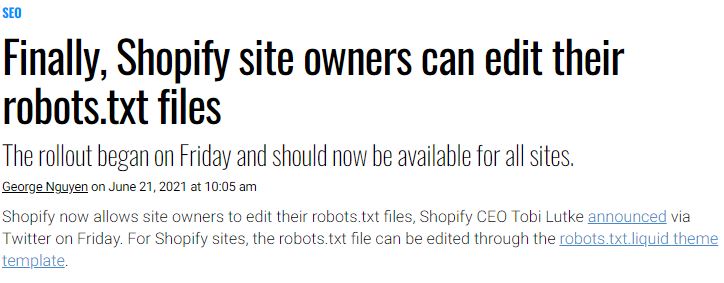
If you know what you’re doing and you know why you want to go in there and change things, it’s a piece of cake now. No plug-ins, modules, apps, none of that stuff is needed, easy peasy. Probably even easier with WordPress because even with WordPress, you need a plugin with that. You can’t just go in and edit it in most cases.
Ross: Nice, very nice. I can imagine it’s going to be very long until Yoast jumps into that market. I’m surprised they’re not there now. I thought they did, but they don’t have a plugin yet.
Scott: I feel like Shopify has definitely grown a ton in the past, especially since COVID, with more people coming into the eCommerce world that weren’t before. I think there probably is a market that would be worthwhile for Yoast at this point, but they’re so busy dealing with WordPress maybe they just don’t need it.
Ross: Yeah, I don’t know. I would put money on it happening soon. There’s just so much that’s been going on with eCommerce since COVID that it’s got to be coming, but who knows. Anyway, it does sound good. It’s nice to hear that Shopify is listening (finally) to some of the suggestions over the many years they’ve been running. It is a very good platform. I don’t ever hesitate to recommend it. We certainly don’t hesitate to take work on when they have a need for optimization because in general, it’s pretty damn good to optimize, isn’t it?
Scott: All in all, it seems to do quite well. We have one client in particular who I think her husband built the website and he didn’t really know what he was doing. Somehow, when it comes to things like core web vitals, it rocks. I sent them an email saying, whoever built your site (I didn’t know it was her husband at that time), I just want to say, pat on the back on whoever built this because the scores are fantastic. She’s like, he just built it, he didn’t know. Just out of the box, the web vital scores are awesome. Things like that go a long way.
Ross: One of the things I heard reminds me of this is one of Yoast’s podcasts recently talking about how a lot of people are trying to think ahead (usually this is enterprise level), but they’re still trying to think ahead and build in redundancies in case something happens in Google or this and that. But it becomes a […], increases code, and can actually cause issues too. There’s almost a benefit and it probably shows it—no offence to the designer—that a certain amount of ignorance is bliss.
Scott: It’s true. I believe that. How often have you gone in to try to fix something, and it may look better but it performs worse. Then you have to go back and tweak it. For sure, I get it.
Ross: I highly recommend it, I’m sure they’re all good. I don’t get around listening to them all, but I listened to the recent one with a dear friend Cindy Krum, MobileMoxie, she did an interview with Yoast. She’s wonderful. She did a great job. As usual, lots of really good, intelligent discussions about the future of mobile marketing, how to get around things. It is not 101 necessarily.
In fact, I think of these at one point, they said that a lot of what they’re talking about is more for people who want the cutting edge, that’s usually enterprise-level when it comes to mobile. It’s really worth the listen. I think I got a few more minutes left, but I heard the majority of it based on talking points I saw. Well worth listening to, and Yoast is always fun to listen to. Shopify is all in all a good platform to go with so this is good news.
How Google cuts and ranks results sets with ma
You’re not going to get anything very insightful out of it, but it is interesting in that you do discover how they break it down. Here I’ll give you a couple of points and see. I’ll read off a component of it. It’s Gary Illyess, he’s pretty good—in this industry good, but […] stumble here in my case as I try to read it.
This was written by Barry Schwartz so it’s a bit of his, and a bit of Gary. “This list is created but they are not done with ranking there, with the cut down list of 1000. He said in this cutdown list, that is where “the magic” is, the magic signals,” this is Gary saying this now, “that we still apply the results to make them better for the user’s query. Barry says, “One example is RankBrain, as a magic signal, but he also mentioned the HTTPS boost as another.”
I laugh hard about that because even here, he mentioned that it’s a tie-breaker—it’s a tiny boost. That’s the only thing he talks about, he doesn’t share about anything else really. He just explains that they then break it down and it’s certain things. Their magic formula will make the one ranking double in relevance over another other, and it will then move up. Essentially, it’s all about the ranking algorithms magic elements without saying anything more.
For some reason, it was still interesting to read. Now they’re talking about it, it sounds useless, but it was actually kind of interesting because I think it’s a little peek into how they think that’s all.
Scott: It’s like when your three-year-old says, dad, how do birds fly or where do babies come from? You reply with magic. It’s kind of the same. The universal magic answer that should just satisfy all.
Ross: They bumped into each other and it’s magic.
Scott: That’s not quite where I was going for, but sure it works as well.
Ross: It’s funny that in the comments is a priceless thing from a Saturday Live skit. I forget his name, but he’s going, magic. You could probably see me doing it, magic, anyway. People are really just scorning this whole thing and I can’t blame them. I mean, we all know that search results are far from perfect and there are some examples here of some garbage that still show up and people get pretty irate about it. But you know what, Google’s always going to be working on this stuff. They need us to test it off for free and fix it. Help them fix it.
I try to intersperse into our episodes little things that Scott and I run into on a regular basis. In my case, running a business and dealing with contracts, that kind of stuff. In this case, a very prominent client of ours decided to pause their SEO. A bit dumbfounded by it because even in their reply or their statement in the email they said, we’re really happy with the movements that have been going on. It’s going well. We like working with Scott, that’s a first
Scott: Really? Holy cow. Yes. I’m going to phone my mom, just give me a second here.
Ross: They are only three months in?
Scott: It’s new. Yeah, I think that one actually started in April. Yeah, three months roughly.
Ross: It’s way too early. Sort of my title of this section of our discussion is, should you pause your SEO? Perhaps money is seriously tight, you don’t have a choice, you don’t have a choice. It’s that simple. In their case, they’re pausing it in favor of ads, which they’re so thrilled with because they’ve gotten so many results. Well, that’s natural.
Scott: I’ll point out, also us as well.
Ross: What’s that?
Scott: I’ll just quickly point out that’s us as well, the ad management.
Ross: Yes, of course, we do that too. SEO is so important because we know it’s going to have better long-lasting results. You make your investment now but it pays off major dividends later. It is frustrating when someone pauses it. They think that the momentum is just going to continue. There’s going to be a small amount of it, we’re good at what we do. But the fact is, we need to build it more. Build it, build it, build it, and build it into the tidal wave versus a lapper.
When you’re considering whether or not you should pause your SEO, really think about how long it’s been. Ask your SEO and obviously, you’re going to read through the lines, no SEO wants to stop working. If they’re a good SEO, they’ll say, give us three more months. At that point, let’s take a three-month break because anyone who’s running a company—an SEO company, a web marketing company—knows that you can’t fight budgets really.
When a client is running low or wants to cut things back, you’ve got to find a happy medium, but you also want to keep in mind that your job is to deliver. Do what you need to deliver so that they come back. It is a little frustrating. I’m going to talk to the client because I haven’t had that chat yet, but I’m just going to state that this is too early to pause. I get what you’re doing, but if you want SEO to have any lasting effect, we need more momentum and three months simply isn’t enough.
I’m sure there are other instances where listeners may have had a really good reason to pause their SEO no matter what. Absolutely, I’m sure that’s great. You share them with us actually on our forum. Go to facebook.com, type in SEO 101 podcast, and then search and you’ll find our group. Please do post your questions or your experiences with that. It’d be fascinating to talk about it.
It is a big part of everyone’s business. Marketing budgets and SEO sometimes either seem a little bit vaporish. They just don’t know how much is being done or how much value they’re getting, especially if the company they’re working with isn’t clear enough about that. We do our best to be clear. We’re trying all the time to improve upon that.
But just the same, some clients don’t even read that and they don’t acknowledge it. Then they wonder why things are going down, and we don’t want to see that. We don’t. Anyway, I’ll probably beat that to death, but please post something about it if you have any experiences with that. We’d love to talk about it in the show.
Okay, let’s take a quick break. When we come back, we’re going to talk about the summer of Google updates because there are a few right now.
Welcome back to SEO 101 on WMR.fm hosted by myself Ross Dunn, CEO of StepForth Web Marketing, and my company’s Senior SEO, Scott Van Achte. All right, what is happening with the summer of Google updates?
Scott: Google, they’re working hard on updating things. We all know that there are algorithmic updates probably three or four times a day. There’s well over 1000 a year they say, but these are bigger updates. One’s that people take note of, they’re quite big. I don’t even know where to start here.
At the beginning of June, we started with the most recent core update. That was part one of the latest core update on June 2nd. Part two of that update just ro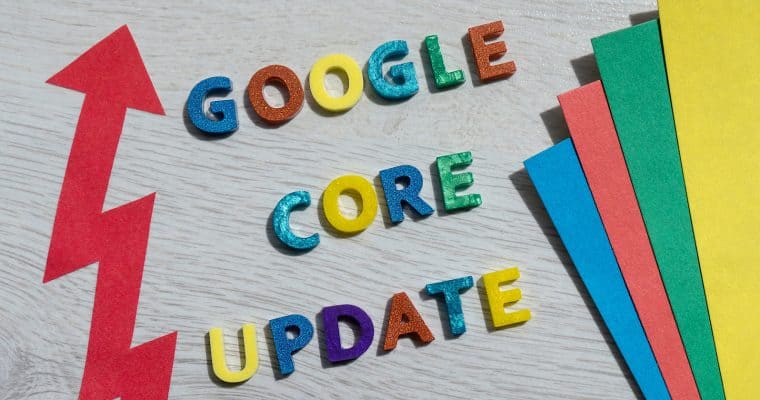
July 1st is Canada Day and the Fourth of July is a couple of days after that. So yeah, a great time for a core update. Thankfully, at least when it comes to our clients, we actually had one client who had a bit of a win there and the rest basically stayed neutral with smaller gain. We skated through that one, which is fantastic. Not always the case, but it was this time. That’s fun. We got core updates happening in July, the page experience update started rolling out in June and that’s going to continue until August until it’s fully done, so they say.
We also had a spam update, which took place near the end of June. It was another two-part update. Google is really getting into breaking things up and rolling them out slowly, I see. Spam updates took place on the 23rd and the 28th that affect web and image search globally. You are listening to us, so you’re probably not a black hat spammer. You may have not seen any effect of that.
If you’re a bad guy out there, you’re probably hurting right now, I don’t know. But our clients are all so-called white hats. We don’t generally, at least right now, I don’t think we have any clients who are in industries that are really spam-heavy in search results. It didn’t really affect us.
If you’re in the gambling industry, any kind of adult-oriented, maybe supplements, or any of your money, your life type sites—really a lot of them, you might have seen gains as a result of this. Unless, of course, you are one of the spammers. But of course, you’re not. If you’re an honest guy or person, you probably saw little to no movement and probably only positive, if anything.
Who knows, probably more updates are coming soon. When did summer start? About two weeks ago, technically. We’ve got two months more, maybe there’ll be another core update in August. Who knows.
Ross: A lot of colleagues are sharing our sentiments from earlier in other shows that the core web vitals are good to follow. Anything that speeds up your website and provides a good experience for users and potentially increases conversions, as a result, is a good thing. You can’t fault that, but don’t let anyone stress you out about it.
Just because they’re being put into play does not mean that you’re going to lose rankings, that you’re going to be really behind the eight ball if you’re not jumping on them right away. Even their analysis tools are kind of garbage. They’re changing, nothing’s firm. You’ll do one test one day and it’s different the next.
Scott: They’re definitely saying the page experience update is focused largely as a tiebreaker. I’m hearing the words tiebreaker a lot lately. But what’s actually interesting (and I haven’t even told Ross about this yet) is I’m working on a very small kind of consulting contract right now. As part of this, I want to take a look and see how their PageSpeed Insights were looking, their core web vitals, and that sort of thing.
I really am curious. I want to look back at their historical data and see how they’ve done over this update if it’s made a difference because their mobile score and their desktop score in PageSpeed Insights was 100, which I don’t think I’ve ever seen that ever to see 100 across the board.
Ross: Something’s broken.
Scott: I’ve seen it close. I’ve seen a lot in the 90s, I’ve never seen 100 and 100. I shouldn’t say never, but the sites I’ve seen it on, we don’t even have to talk about those. When it comes to core web vitals, their scores are rocking. It’s green across the board, looks really, really good.
I really want to know, before that update started, how they were looking and how they are after and see if they saw any wins there. If anyone’s going to, it’s those sites that are just rocking it and have awesome scores.
Ross: We’ll have to see how that all pans out.
Scott: Realistically, it’d be probably a couple of years before it actually has a noticeable impact like HTTPS for instance, and all that well.
Ross: Again, yeah, like you say “tie-breaker”. It’s not going to be the end-all. It’s just something to work on. I actually found it funny listening to that podcast with Cindy and Yoast. They were saying that they felt it was just Google. I’ve heard this a number of times, Google’s just using this to make us test for them. We’re just improving the internet for them to make it cheaper for them to index.
Scott: True.
Ross: They’re really good. If it’s just costing us too much money to index all your content. So speed it up, but make it lighter. Thank you.
Scott: They’re just tricking us to make the internet better. In fairness, sure, Google has a lot to gain by people having faster sites, but so do I. If I’m out and about on my phone and I want to look up something on my cell data plan, those of you in Canada know we pay way too much for cell data. Saving every little megabyte makes a big difference on your bill at the end of the month.
Some places don’t have to worry about that with your unlimited plans, lucky people, but not us. It makes it better for everybody really, and it’s faster, it’s cheaper. Just Google saves probably the most for sure.
Ross: Yeah, absolutely.
Scott: I shouldn’t say for sure, they just do. It’s not even a question.
Ross: Yeah, and the thing that bothers me, I think, is that the SEO industry has jumped on this […]. It’s all about you need to upgrade everything now. It’s going to cost you this many thousands of dollars. You know what, I get it, we all have to eat but don’t overdo it. The clients don’t need to think that this is the end of the world if they’re not getting a top-of-the-line core web vital.
Scott: In fairness though, a year ago or so when this was first announced, it kind of seemed like it was going to be critical.
Ross: It did.
Scott: You can only go with what information Google gives you.
Ross: I think we just know better by now.
Scott: We really should. Google said something, ah ignore it. It doesn’t matter.
Ross: Unless it seems like it’s obviously bad like spam, then don’t worry so much about it. Let things shake out. It always comes out at the beginning as something one way and then it changes a bit later. It never seems to fail.
Google Offers 5 Content Creation Tips 
Number one, block time on your calendar. That is not something most people do. I have to admit, I have a hard time doing that even and it is singular. You can’t get anywhere if you don’t make the time to write that content.
Scott: And commit to it. How often do you block time in your calendar and then go off on some tangent anyway?
Ross: Yeah, and our contracts exclusively, literally always say, you need to write content for us to be successful. There are rare circumstances where clients come to us with a ton of content they haven’t marketed well and we can just work with that, but it’s so rare. Really, what it comes down to, you have to continually be a thought leader, show yourself as being the best at what you do.
In the case of dentists, it’s not about being a thought leader. It’s just ensuring that you’ve got the content there, that you’re not falling behind the competition. And potentially, you’re jumping on top of new technologies or discussing new technologies at least and saying why you don’t have them yet or why you may next year. Why not just keep people in the know?
The next one is to play to your strengths. Talk about what you know, do a great job of it, always do a great job. Create in batches, is number three. If you’re going to do some writing, try and do it in a batch of three or four articles, especially if you can do them in series-like episodes. Part one, part two, part three, part four of this particular topic and break it into quite amazing pieces of information that they can later—this is just from my own experience, it might even be in here. You could then create that into a little eBook download later. Just flesh it out a little more, but it becomes its own little eBook ready to go.
Then number four, reduce, rework, and repurpose your content. There you go. In some cases, you’ve written content that did really well two years ago. Sure, it’s outdated. But really, how much effort would it take to make it up to date again? Because those pages typically have very good link authority, did have some buzz in the past, it’s not too hard to recreate that again. You end up doubling the amount of links perhaps that has gotten and it’s just sensible. It’s a really good move.
Repurposing your content, and it comes back to that eBook concept I was telling you about. You could even then break it into a video series. Perhaps if we had a piece of content that was doing exceptionally well, we would then decide okay, well let’s blow this up a bit. Let’s create a podcast series about it now.
Next, prioritize value over quality. I want to see what they mean by this, let me just jump down to five. “A common stumbling block for content creation strategists is focusing on quality. What often happens is that each article becomes a monumental undertaking centered on comprehensiveness, equating wordiness with quality.”
I’m quoting here from Rogers’ article, “Writing a Top 500 article as a way to outrank a publisher who is ranking well with the Top 50 article is a naïve approach to content creation. When writing content it is always best to focus on providing value.”
There’s a quote here from Rigel Gemini, don’t know who that is. “Focus on the value you offer your readers. People will read a post that has an eye-catching image, but more importantly, people will return to your knowledge and expertise.”
I’m not sure I’m grasping this 100%, but I actually believe in quality. I don’t believe wordiness means quality though. I believe in creating ultimate articles. The kind of thing that someone can’t help but share, that people just go, I’m bookmarking this when I need to know how to make a video or how to understand the schema, all numbers of things. That’s really what you want to do. You want to create something that’s so useful.
Sure, someone else might have the same content. In fact, they might say the exact same thing, but it’s just not written as well and provided in such a simple, digestible format. That was that article. I think it brought up some good points there that were worth recovering.
All right, we have some Mueller files, of course. Google’s John Mueller, sometimes there is no solution. I got a kick out of this. The VHS comment particularly. Do you want to take this on Scott?
Scott: Yeah, sure. There was a question posted to Reddit. I’m not sure of the poster’s name. They said, “If I hire an SEO expert service would they be able to find out what’s going wrong with my website and help me improve it?”
They added a bit more detail saying their site has had little to no traffic for six years, “I just blog, I don’t do any coding or anything, I don’t do link building either” It’s kind of funny because there’s a lot to unpack there. There’s just so much to unpack there but we’ll start with John’s response.
He says, “One of the things to keep in mind is that it’s possible that the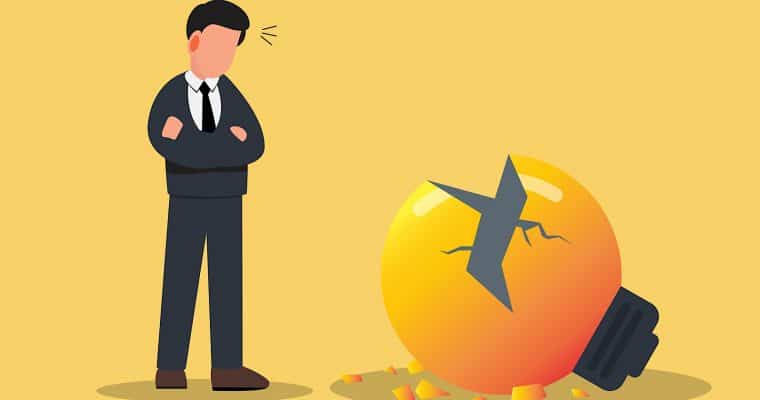
“Sometimes it’s just that the site strategy is now obsolete. You can have a fantastic website, make it super-fast, have ‘high authority & trustworthiness’ (however you want to define that), but if you’re selling VHS cassettes, you’re going to have a bad time.”
I don’t even know where to start. I’ve got a lot to say about this, but it’s true. We don’t have enough background information on buddy’s website here so maybe his specific situation can be solved. Maybe he’s got some critical errors, whatever. But it’s true though if you have a product or topic that you’re talking about like if you’re selling VHS tapes you’re giving advice on repairing typewriters. It doesn’t matter how much SEO you do, you’re not going to get a heck of a lot of traffic.
He does ask about traffic, not rankings, which is a totally different thing. I mean, he could have awesome rankings or buy VHS tapes now with one search per month. It’s not going to do you a heck of a lot of good.
Ross: I was trying to think of other ones that also would be just as bad as selling LaserDiscs or cassette Walkmans.
Scott: I miss my Sony Walkman.
Ross: I do too. I actually still have mine.
Scott: Do you?
Ross: […] but I love looking at it because it was my baby, I love it.
Scott: You love looking at it. That’s all that you can do with it now.
Ross: It’s good memories, man. It does still work too but it got cracked.
Scott: I miss taking a tape out of a Walkman, grabbing a pencil, and winding it back up because it’s all like all shot out inside the Walkman. Kids these days will never know. They’ll just never know.
Ross: No, they won’t. They’re all what the hell are these old fogies talking about?
Scott: What is a tape?
Ross: Perhaps the older listeners will be thinking, I remember the 8-tracks?
Scott: Yeah, 8-tracks. I feel like my first car had an 8-track in it.
Ross: Oh, dear. Wow.
Scott: That stereo came out pretty fast, but it had one. It was there.
Ross: I love it. Do you have anything else you want to unpack there?
Scott: Oh, I don’t know. Probably not.
Ross: Buying a bunch of links?
Scott: The buying a bunch of links, that’s kind of funny. It almost implies that buying a bunch of links can help. It’s not wrong. Depending on how you do it, I suppose buying links can help. He says it kind of in a way that’s kind of nonchalant, like, yeah, you can go buy a bunch of links. That’s fine. They won’t help you in this case. It caught me off guard. I wouldn’t expect to hear those words in that context coming out of John.
Ross: Well, he did put in a quote.
Scott: That’s true, he did.
Ross: Chuckle, chuckle. We know he’s chuckling. We know John well enough. In this next bit, he says Google’s John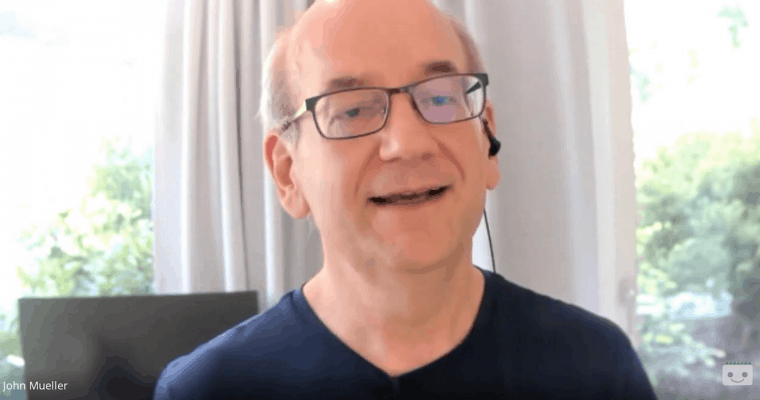
Remember, Yoast and Cindy were talking about this and the fact that it is very true that this is simply not only not true, but SEO is just getting busier. There’s just so much going on, especially with all this cookie nightmare for paid ads. Paid ads are still busy. Still lots of value there, but it’s more difficult. SEO is winning on that one. But no question about it, a lot of people don’t understand what SEO is. They’re bundling a name with a whole bunch of other stuff.
Anyway, I’ll read John’s response that he posted here says. He says, “I don’t know. Good question. I don’t have that five-minute answer on the future of SEO. I think one of the things that people always worry about is everything around machine learning and that Google’s algorithms will get so far as to automatically understand every website and SEO will be obsolete, nobody will need to do that. I don’t think that will happen. With all of these new technologies, you’ll have new tools and new ways of looking at your website and making it maybe easier for you to create really good content, to create clear structures for your website.
Similar to how things have evolved the last 10–20 years as well wherein the beginning you would write your own PHP code and craft your own HTML and it was a lot of work and overtime, all of these CMS’s evolved where essentially anyone can go off and create a website without having to really understand any of these HTML and kind of like server-side basics.” This is a long quote.
Anyway, what it comes down to is, yes, Google’s made it easier for people to get into the field, but there’s always going to be advanced aspects of it. That’s my take on it. There are always going to be problems that an SEO is required for navigating at all. It’s funny, I often find it relatively simple. But of course, we’ve been in this game for a long time. I underestimate how much we know. I talked to other people and a lot of people are still talking from the basics and SEO is never going to be simple for them. What do you think?
Scott: It’s such an age-old question, the death of SEO. I think it’s almost always just clickbait because I don’t think it matters what Google does. SEO can never die. No matter what technology does, it can never die because there’s always that human aspect that you need.
Where there’s a number one, there’s always a number two that wants to be number one, and how are you going to get there? SEO may just come down to installing the correct AIs on your website to make things happen. I mean, we’re not there yet, but just because Google fully understands every website in the world—let’s assume they did—you still need to make yours better. That might come down to content generation.
Even if it’s an AI creating the content, you need to seed that or you need to train it as to what you want. There’s always going to be some aspect of SEO. It will evolve. In 20 years from now, we’re not going to recognize it compared to today. Just like SEO from 2002 is significantly different from what it is now. It will never die.
Ross: It’s just accelerating, especially with machine learning.
Scott: And GPT-2. There was a lot about that with SMX Advanced, people have been talking about it. I’m trying to grasp it. I don’t know how I can use it in my day-to-day yet, but those days will come of course. It’s still an emerging technology really, but all the AI stuff is insane and it’s going to be a big part of every SEO’s future. I want to say 10 years because I don’t want to learn it all right now, but it’s going to be a lot quicker than that for sure.
Ross: Yeah, two years. It’s going to be seemingly advanced over two years.
Scott: Absolutely.
Ross: But they’re definitely hitting walls. It’s all another discussion. I’m certainly not an authority on it. I read it when I can, but there’s no question that it’s going to make things very interesting for Google trying to find spam because although the writing is not great yet by these auto spinners, auto writers that artificial intelligence can use, but you can see a time where that will occur. Then how the hell will Google determine what is written by humans and what isn’t, or will it matter as long as the content is good? That’s really what it comes down to.
Anyway, fascinating stuff. The long and the short of it is no, there’s no way that SEO is becoming obsolete. It’s just not even possible. Yes, of course, we’re biased here. I think we’ve made it clear why that doesn’t matter. It’s simply impossible for it to become obsolete anytime soon, anyway. I’ll keep my fingers crossed here. Just so there’s no advance that screws everything up.
Scott: Just in case.
Ross: We never see. On behalf of myself, Ross Dunn, CEO of StepForth Web Marketing, and my company’s Senior SEO, Scott Van Achte, thank you for joining us today. Remember, we have a show notes newsletter you can sign up for at seo101radio.com. Don’t miss a single link and you can refresh your memory of a past show at any time. Have a great week, and remember to tune in to future episodes, which air every week on WMR.fm.
Scott: Hey, thanks for listening, everybody.
